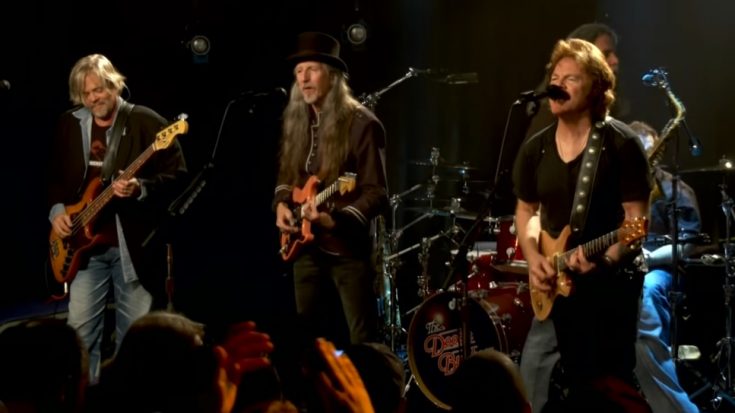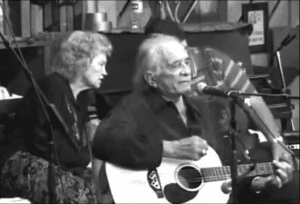The Overlooked Songs Of Each Doobie Brothers Album

The Doobie Brothers live - Kingscup20 / Youtube
San Jose, California’s pride, The Doobie Brothers, have been active in the industry for five decades or so and haven’t slowed down one bit. To be fair, the band has seen its share of ups and downs during its career run, changing lineups and creative centers (Johnston and McDonald eras) that meant great shifts in their musical direction. Their songs like “What A Fool Believes” or “Long Train Runnin'” have established the Doobies as a lean, mean rocking machine, but let us take a dive at some underrated cuts and why they deserve much more.
“Travelin’ Man” – The Doobie Brothers (1971)
The lazy and easygoing instrumentation on the song “Travelin’ Man”, from the Doobies’ self-titled debut album, held a certain amount of tension in the verses to express the weariness and content of the lonely traveler. Immaculate vocal harmonies also drag a sense of peace to counteract the subtle gloominess of the song.
“Jesus Is Just Alright” – Toulouse Street (1972)
Originally penned and performed by Arthur Reid Reynolds and his group in 1966, and was adapted by The Byrds two years later. The Doobies followed suit and used the Byrds’ arrangement to base their own rendition on, but had some modifications themselves to fit the gospel track into their repertoire.
“Dark Eyed Cajun Woman” – The Captain and Me (1973)
“Dark Eyed Cajun Woman” features a slow and tasteful progression with conservative instrumentation that is enhanced by keyboard accents and guitar licks for that smoky and mysterious feel. The bluesy quality carried by the song gives it a certain charm unique to any song on the 1973 LP.
“Road Angel” – What Were Vice Are Now Habits (1974)
Genius and tight rhythm work are the key takeaways on 1974’s “Road Angel”. The seemingly odd-timed riffing and consistent backbeat gives the biker-themed cut the grit and fun it needed to take off, not to mention the equally-racy vocals and harmonies.
“Rainy Day Crossroad Blues” – Stampede (1975)
The seemingly bright and upbeat acoustic progression of “Rainy Day Crossroad Blues” carries youthful energy within it until the track gets halfway its runtime and is replaced by a slower and fuller instrumental with great blues guitar accents sprinkled here and there.
“It Keeps You Runnin'” – Takin’ It To The Streets (1976)
Michael McDonald’s underrated gem in “It Keeps You Runnin'” provides the listener with a different perspective on sentimentality on how to get to the heart of the matter. As a pro on the keys himself, McDonald infuses the track with some great jazz and R&B textures for good measure.
“Echoes of Love” – Livin’ on the Fault Line (1977)
Soul influence was pretty evident on “Livin’ on the Fault Line” by the Doobie Brothers. The lighthearted “Echoes of Love” provides temperance to the heavier tracks on the album, topping its own charm with poppy vocal harmonies and jazzy chords that would soon be relevant by the next decade.
“Here To Love You” – Minute By Minute (1978)
While many might say how the Doobies’ sound inherently changed with Michael McDonald assuming the lead creative position in the band, it all worked out for the better, especially on tracks like “Here To Love You”. The richness of his vocals, combined with the stylish jazziness and tight band performance is just one for the books.
“No Stoppin’ Us Now” – One Step Closer (1980)
Another great testament to the polished songwriting of the band as they aged was “No Stoppin’ Us Now” on 1980’s One Step Closer. While the song hits it off with a chill vibe, strong guitars come in for the middle-eight to show that the band hasn’t lost its touch from where it came.
“South of The Border” – Cycles (1989)
Marking the band’s reunion after breaking up in 1982, Cycles saw the return of most of the members of their original early lineup. This meant focusing more on their rock and roll sound which didn’t disappoint fans as the return of a more edgy and focused sound is featured on the criminally-underrated “South of The Border”.
“Divided Highway” – Brotherhood (1991)
“Divided Highway” shows the band in top form after almost two decades of their initial rock material hitting the airwaves. This riff-based rocker boasts impeccable melodic structure and a tight roll that gives it a solid feel, reminiscent of their earlier songs.
“Jericho” – Sibling Rivalry (2000)
“Jericho” from the 2000 album Sibling Rivalry contains a modernized blues jog evident in its circular riff that is mainly driven by the tasteful bass and phrasing, while the brass accents and vocals are reminiscent of ’80s funk due to its delivery.
“Far From Home” – World Gone Crazy (2010)
The Doobies tug at your heartstrings with 2010’s “Far From Home”. The country-influenced progression doesn’t douse the song in too much sentimentality while still preserving a good deal of emotion to resonate with the listener. All in all, the lighthearted arrangement contrasts the evocative lyrics to prove that the band hasn’t mellowed down, only redirected.
“South City Midnight Lady” – Southbound (2014)
For the band’s fourteenth studio album, the Doobies opted to remake their classic hits into a more contemporary setting. It’s safe to say that they aged like fine wine, especially with the refined quality on the recording of “South City Midnight Lady”, featuring country star Jerrod Niemann.

























